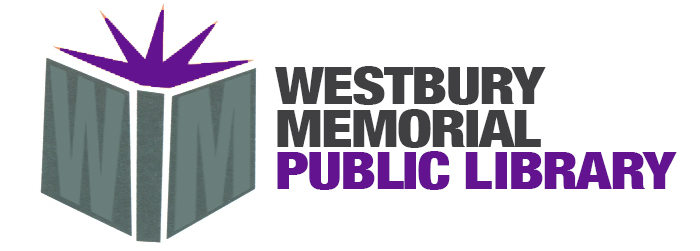Librarian's Pick
Here's what our librarians are reading lately.Librarian’s Pick: Motherhood So White – Nefertiti Austin
 In her memoir, Motherhood So White, Nefertiti Austin provides valuable firsthand insight into what it means to be a black single mother and to reject the constraints of societal expectations.
In her memoir, Motherhood So White, Nefertiti Austin provides valuable firsthand insight into what it means to be a black single mother and to reject the constraints of societal expectations.
When Austin decided to adopt her son, August, a black boy placed in the California foster care system, she was met with criticism and disbelief, especially from her own family. They couldn’t understand why she wanted to legally adopt a stranger, an outsider. For many black people, adoption is a cultural custom reserved for white people, unless you had “a connection with that child, even a tenuous one.”
As a child, Austin’s grandparents provided stability and guidance while her parents drifted in and out of her life. Her own adoptive experience had shown her that families, especially black families, didn’t need to be limited to the traditional expectations of one mother and one father, or to the demands of the white gaze.
When she decided to become a mother at 36, Austin had to first become a foster parent, as decreed by California state law. This journey, which eventually resulted in adoption, was not without trials and tribulations. Not only did she face the daily challenges of newfound motherhood, she also had to contend with America’s legacy of systemic racism and discrimination, which renders black mothers either as invisible or as tropes in a dehumanizing narrative.
Austin’s memoir is a natural response to both the erasure of black mothers and the dismissive and demeaning misrepresentation of black motherhood. She relays her experiences with equal parts candor and consideration, careful not to paint communities or motherhood with broad brushstrokes as she dismantles the notion that all “real” families must look and act alike. Motherhood So White is a testament to the power of love as a radical act and an urgent call to reclaim motherhood from institutionalized whiteness.
Librarian’s Pick: Olive, Again – Elizabeth Strout
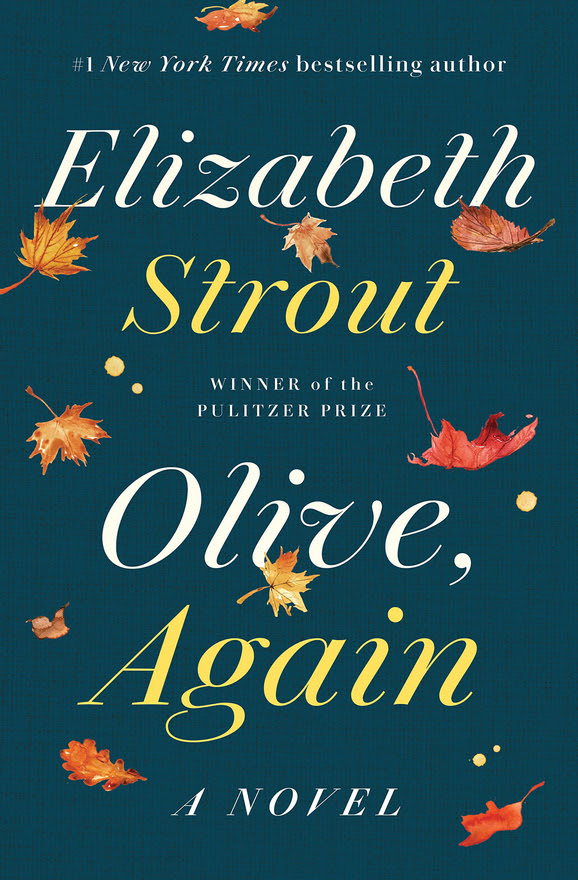 “In 13 interlocking stories set in the small coastal town of Crosby, Maine, Olive travels through old age in her own inimitable style. She’s called an “old bag” by more than a few townsfolk, but she is loved by those who have, over the years, come to appreciate her honesty and complete lack of pretense.
“In 13 interlocking stories set in the small coastal town of Crosby, Maine, Olive travels through old age in her own inimitable style. She’s called an “old bag” by more than a few townsfolk, but she is loved by those who have, over the years, come to appreciate her honesty and complete lack of pretense.
In one story, Olive shares her fear of dying with Cindy, who cared for Olive’s late husband, Henry, and who may be dying of cancer herself. Olive reminds her that Cindy’s husband and sons, as well as Olive, will be “just a few steps behind” her if she does die.
A few years after Henry’s death, Olive befriends widower Jack Kennison. Each has a child who doesn’t really like them, and both are lonely. They marry—to the dismay of Olive’s son, Christopher—and go on to enjoy eight years together.
Olive lives through some health scares, first totaling her car after confusing the accelerator with the brake, then suffering a heart attack in her hairdresser’s driveway. When Olive is assigned round-the-clock nurse’s aides—the story “Heart” poignantly portrays Olive’s growing dread of being alone—two of the aides are especially kind to her. One is the daughter of a Somali refugee, the other is a Trump supporter, and Olive surprises herself by befriending them both.
Olive, Again is a remarkable collection on its own but will be especially enjoyed by those who loved Olive Kitteridge. It’s a book to immerse oneself in and to share.”
Librarian’s Pick: the Dutch House – Ann Patchett
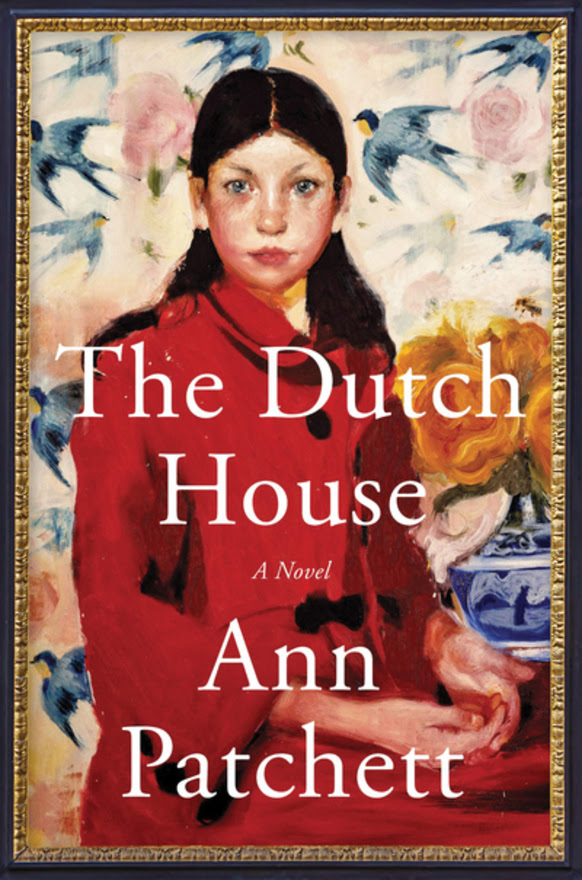 “The titular mansion is located in the Elkins Park section of Philadelphia. It was once owned by the VanHoebeeks, whose imposing portraits are still hanging on the walls when an aspiring real estate developer buys it after World War II. He brings with him his two children—Danny, 3, and Maeve, 7—and his wife, Elna. The house, which has fallen into disrepair, comes complete with furniture and a servant, Fluffy. Elna is horrified by the extravagance of the property and her husband’s wealth, which he’d been keeping a secret. She starts to disappear, first sporadically, then permanently.
“The titular mansion is located in the Elkins Park section of Philadelphia. It was once owned by the VanHoebeeks, whose imposing portraits are still hanging on the walls when an aspiring real estate developer buys it after World War II. He brings with him his two children—Danny, 3, and Maeve, 7—and his wife, Elna. The house, which has fallen into disrepair, comes complete with furniture and a servant, Fluffy. Elna is horrified by the extravagance of the property and her husband’s wealth, which he’d been keeping a secret. She starts to disappear, first sporadically, then permanently.
Left with their emotionally detached father, the children find that things can only get worse. In true fairy-tale fashion, a wicked stepmother and her own kids move in. Danny (the narrator) and Maeve are displaced from their home when their father suddenly dies and leaves them both almost penniless. An unshakable bond forms between the brother and sister as they survive and strive, pining for their lost home and enraged by the woman who took it from them.
Along the way, Patchett’s knack for aging her characters over many decades serves the story well. The Dutch House is a vast, almost preternatural property, and the characters who have, at one point or another, inhabited it are at the heart of this absorbing tale. It’s fitting and inevitable that the home eventually beckons them back.”
Librarian’s Pick: How To Be A Family – Dan Kois
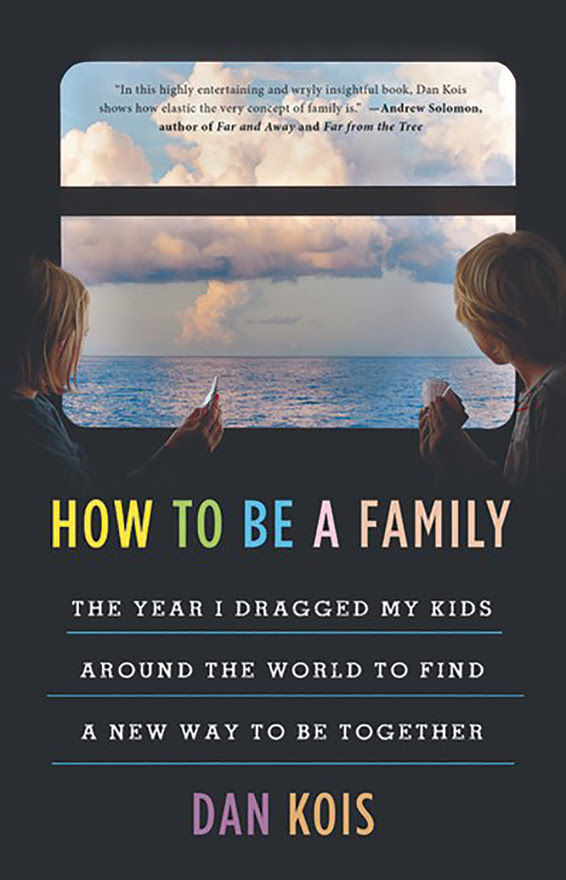 “In 2017 Dan Kois, his wife and their two children did what many families secretly dream of doing: They packed up their belongings and spent a year living abroad. Their life in Arlington, Virginia, had come to feel like an endless rat race—Kois is an editor at Slate and his wife, Alia, a First Amendment attorney—leaving them feeling exhausted and overwhelmed. They asked themselves, “Could the two of us set aside our relentless quest to make sure our children had every material and educational advantage, and instead focus for twelve months on caring for all our hearts and souls?”
“In 2017 Dan Kois, his wife and their two children did what many families secretly dream of doing: They packed up their belongings and spent a year living abroad. Their life in Arlington, Virginia, had come to feel like an endless rat race—Kois is an editor at Slate and his wife, Alia, a First Amendment attorney—leaving them feeling exhausted and overwhelmed. They asked themselves, “Could the two of us set aside our relentless quest to make sure our children had every material and educational advantage, and instead focus for twelve months on caring for all our hearts and souls?”
Kois shares the fascinating and frequently hilarious results in his admirably honest account of that year, How to Be a Family. In addition to Kois’ humorous, self-deprecating style, the book is particularly lively because Kois and his wife picked such diverse spots to live: the blustery coastal town of Wellington, New Zealand (their favorite spot); the bustling city of Delft in the Netherlands; tropical Samara, Costa Rica; and deep in the heartland of Hays, Kansas, where a friend of the family lived. (Yes, Kansas!)
Kois and company adored their friendly, welcoming neighborhood in New Zealand. The Dutch were not so affable (Kois calls them “mysterious and frustrating”), although the family loved the country’s reliance on bike transportation. Costa Rica was at times monotonous in its endless string of beautiful days, and occasionally the togetherness became too much, prompting Kois to write, “Thank God for cards” (as in card games). In Kansas, they found a wonderful sense of community, discovering that it was “a place where people could bloom.”
In the end, the family found their lives changed but not transformed, realizing that “a place never solves anything.” Nonetheless, their journey was an unforgettable adventure, allowing them the priceless gift of having time to pay more attention to each other.”
Librarian’s Pick: Make It Scream Make It Burn – Leslie Jamison
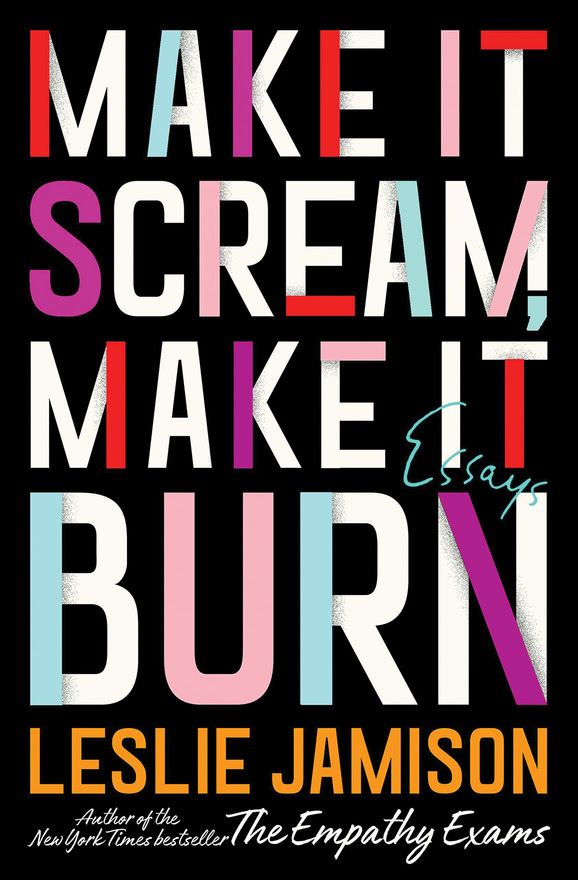 “A tattoo that runs up the arm of acclaimed essayist Leslie Jamison reads Homo sum: humani nil a me alienum puto, or “I am human. Nothing human is alien to me.” Her new collection, Make It Scream, Make It Burn, puts her tattoo to the test. Jamison investigates outsiders: people who obsessively identify with a whale known as 52 Blue, people who believe their children have been reincarnated, people who linger in the online world of Second Life. She takes her subjects seriously, but she also finds herself at a loss to relate. Sometimes connection is impossible. Of her interaction with someone who doesn’t speak English, she writes, “Nothing that is human is alien to me, I would have told him, except I couldn’t, because some things are alien to me, like the Sinhalese language.”
“A tattoo that runs up the arm of acclaimed essayist Leslie Jamison reads Homo sum: humani nil a me alienum puto, or “I am human. Nothing human is alien to me.” Her new collection, Make It Scream, Make It Burn, puts her tattoo to the test. Jamison investigates outsiders: people who obsessively identify with a whale known as 52 Blue, people who believe their children have been reincarnated, people who linger in the online world of Second Life. She takes her subjects seriously, but she also finds herself at a loss to relate. Sometimes connection is impossible. Of her interaction with someone who doesn’t speak English, she writes, “Nothing that is human is alien to me, I would have told him, except I couldn’t, because some things are alien to me, like the Sinhalese language.”
Beyond the limits of relatability, she also explores the weightiness of one person trying to document the life of another. In my favorite essay, she traces the unraveling of Walker Evans and James Agee’s trip to the South, which they completed on Fortune magazine’s dime in 1936 and which resulted in the widely acclaimed Let Us Now Praise Famous Men in 1941. Her astute analysis of the differences between the draft of the magazine article and the published book blew me away.
She deepens her exploration of this theme in subsequent essays, detailing her own journalistic romp to a foreign land and the difficulties of trying to write about what she saw there, and also the way that feminists such as photographer Annie Appel have obsessively returned to their subjects to try and resist the limits of witnessing. Appel has documented herself alongside her Mexican subjects and has, over time, allowed her story to become intertwined with theirs.
The perils of representation weigh on many people, certainly, but perhaps especially on artists. Jamison’s title Make It Scream comes from a review of Agee’s famous book by poet William Carlos Williams. For Williams, it is the duty of the artist to make life scream and smolder—to show the urgency that underlies and interconnects our lives. Nothing human is alien to me. For her readers’ sakes, I hope Jamison will keep pursuing this ideal.”
Librarian’s Pick: Crusaders – Dan Jones
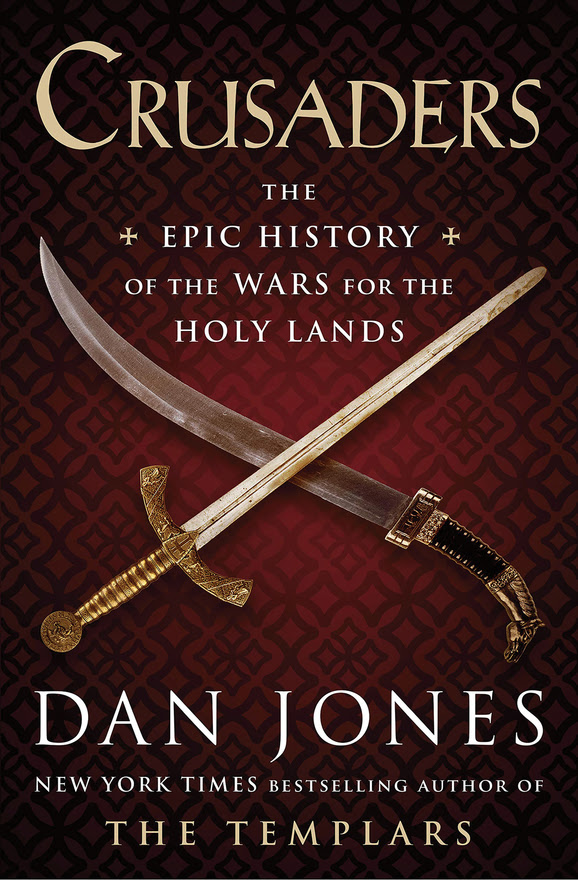 “For more than 1,000 years, Christians and Muslims lived side by side, sometimes at peace and sometimes at war. When Christian armies seized Jerusalem in 1099, they began the most notorious period of conflict between the two religions. Depending on who you ask, the fall of the holy city was either an inspiring legend or the greatest of horrors. In Crusaders, Dan Jones interrogates the many sides of the larger story, charting a deeply human and avowedly pluralist path through the crusading era.
“For more than 1,000 years, Christians and Muslims lived side by side, sometimes at peace and sometimes at war. When Christian armies seized Jerusalem in 1099, they began the most notorious period of conflict between the two religions. Depending on who you ask, the fall of the holy city was either an inspiring legend or the greatest of horrors. In Crusaders, Dan Jones interrogates the many sides of the larger story, charting a deeply human and avowedly pluralist path through the crusading era.
Expanding the usual timeframe, Jones looks to the roots of Christian-Muslim relations in the eighth century and tracks the influence of crusading to present day. He widens the geographical focus to far-flung regions home to so-called enemies of the Church, including Spain, North Africa, southern France, and the Baltic states. By telling intimate stories of individual journeys, Jones illuminates these centuries of war not only from the perspective of popes and kings, but from Arab-Sicilian poets, Byzantine princesses, Sunni scholars, Shi’ite viziers, Mamluk slave soldiers, Mongol chieftains, and barefoot friars.
Crusading remains a rallying call to this day, but its role in the popular imagination ignores the cooperation and complicated coexistence that were just as much a feature of the period as warfare. The age-old relationships between faith, conquest, wealth, power, and trade meant that crusading was not only about fighting for the glory of God, but also, among other earthly reasons, about gold. In this richly dramatic narrative that gives voice to sources usually pushed to the margins, Dan Jones has written an authoritative survey of the holy wars with global scope and human focus.”
Librarian’s Pick: The Giver of Stars
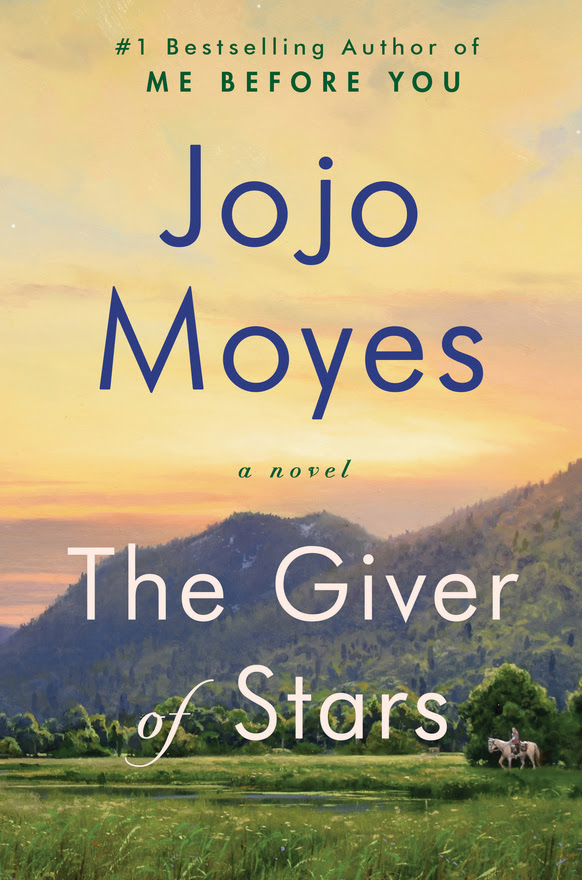 “When Eleanor Roosevelt creates a mobile library system as part of the New Deal’s Works Progress Administration, Alice volunteers to become one of the librarians on horseback to escape her father-in-law’s house. As a librarian, Alice joins four others: unconventional Margery, who lives by her own rules; boisterous Beth, who has eight brothers; Izzy, the library organizer’s pampered daughter, who wears a leg brace and has a beautiful voice; and Sophia, a black woman who risks backlash to work for the mobile library, in violation of the state’s segregation laws.
“When Eleanor Roosevelt creates a mobile library system as part of the New Deal’s Works Progress Administration, Alice volunteers to become one of the librarians on horseback to escape her father-in-law’s house. As a librarian, Alice joins four others: unconventional Margery, who lives by her own rules; boisterous Beth, who has eight brothers; Izzy, the library organizer’s pampered daughter, who wears a leg brace and has a beautiful voice; and Sophia, a black woman who risks backlash to work for the mobile library, in violation of the state’s segregation laws.
Together, these women and their horses face hardship and danger to bring books and information to the poverty-stricken backwoods of Kentucky. In return, they find companionship and fulfillment. The library’s future is threatened, however, when Margery and Alice step too far outside the accepted norms of society, angering the powerful patriarchy of the town.”
Librarian’s Pick: How We Fight For Our Lives – Saeed Jones
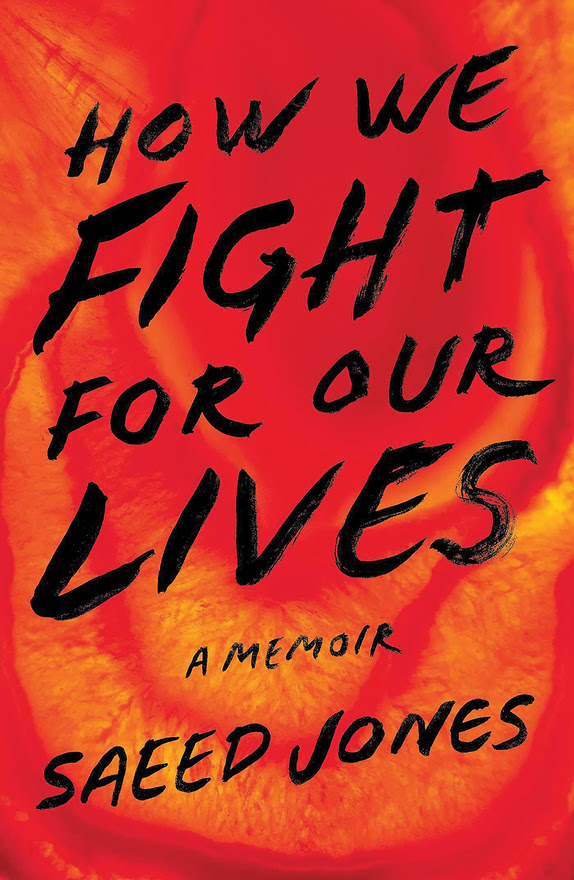 “Through flowing metaphors and dialogue, rich language and deeply personal family stories, we learn about Jones’ struggle for his identity—why he built a suit of invisible armor to protect himself when no one else would. Jones writes, “If America was going to hate me for being black and gay, then I might as well make a weapon out of myself.” Almost every passage feels like a fresh, raw wound, ready to leave a scar.
“Through flowing metaphors and dialogue, rich language and deeply personal family stories, we learn about Jones’ struggle for his identity—why he built a suit of invisible armor to protect himself when no one else would. Jones writes, “If America was going to hate me for being black and gay, then I might as well make a weapon out of myself.” Almost every passage feels like a fresh, raw wound, ready to leave a scar.
Each vignette represents a different stage in Jones’ blossoming life, and together they create a kaleidoscope of the difficulties that can stem from hiding oneself from the world. We travel with him as the child of a single mother in Lewisville, Texas, to his strained teenage relationship with his religious grandmother in Memphis, Tennessee, to destructive sexual experiences with friends, lovers and strangers, to his life in college and beyond, where he has yet to accept himself as a full person, rather than as a performer who needs to be interesting enough to entertain a crowd. Jones recognizes his desire to wear a mask early on, but it’s difficult to remove the mask once he has the chance.”
Librarian’s Pick: Andrew Carnegie Shortlist Finalists 2020

Feast Your Eyes – Myla Goldberg Click here for availability
“In this mesmerizing, brilliantly structured, and deeply insightful novel about a radical photographer and single mother and how her controversial images affect her daughter, Myla Goldberg brings into provocative focus the need to make art, the obstacles confronting women artists, and the transcendence of love.”
Lost Children Archive – Valeria Luiselli Click here for availability
“Intense and timely, Valeria Luiselli’s novel tracks husband-and-wife audio documentarians as they travel cross-country with their two children and deep into the painful history of the Apache people and the present immigration crisis on the Southwest border, while freshly exploring themes of conquest and remembrance, and powerfully conveying the beauty of the haunted landscape.”
The Water Dancer – Ta-Nehisi Coates Click here for availability
“Ta-Nehisi Coates’ first novel is a profoundly imagined and psychologically and socially perceptive drama about the atrocities of slavery sieved through the experiences and convictions of young Hiram Walker, who, as the son of an enslaved woman and the owner of a prominent Virginia estate, possesses a strange and liberating power.”
Figuring – Maria Popova Click here for availability
“Maria Popova brings her zest for facts and passion for biography to this exhilarating and omnivorous inquiry into the lives of geniuses who “bridged the scientific and poetic,” spinning a fine web connecting such barrier-breakers as Margaret Fuller, Ada Lovelace, Frederick Douglass, and Rachel Carson.”
The Heartbeat of Wounded Knee – David Treuer Click here for availability
“David Treuer presents a richly dimensional “counternarrative” to the long-standing depiction of defeated, hopeless Native Americans, documenting, instead, the many ways each assault against Indigenous lives and cultures gave rise to a strong Native resolve not only to survive, but to emerge revitalized.”
Midnight in Chernobyl – Adam Higginbotham Click here for availability
“Adam Higginbotham has created a thoroughly researched, fast-paced, engrossing, and revelatory account of what led up to and what followed the explosion of Reactor Four at the Chernobyl nuclear-power plant on April 26, 1986, focusing on the people involved as they faced shocking circumstances that are having complex and significant global consequences.”
Librarian’s Pick: Grand Union – Zadie Smith
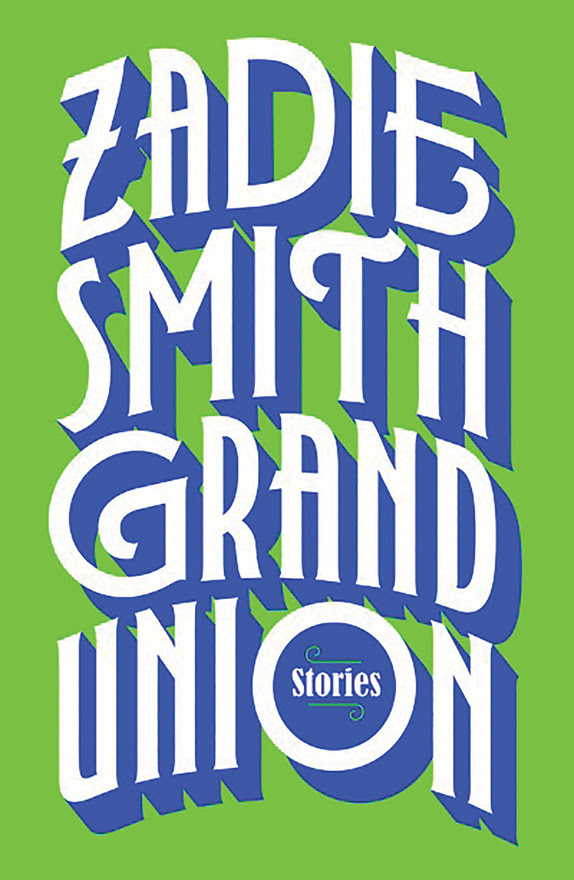 “Elizabeth Taylor, Michael Jackson and Marlon Brando are driving out of Manhattan after a terrorist attack. What sounds like the opening of an urban myth is actually the zany plotline of “Escape from New York,” one of 19 tales in Zadie Smith’s first collection of short stories, Grand Union. These masterful tales impress, engage and occasionally infuriate as Smith brings her dazzling wit and acute sensitivity to bear. These stories are ready to grapple with the complex times we live in.
“Elizabeth Taylor, Michael Jackson and Marlon Brando are driving out of Manhattan after a terrorist attack. What sounds like the opening of an urban myth is actually the zany plotline of “Escape from New York,” one of 19 tales in Zadie Smith’s first collection of short stories, Grand Union. These masterful tales impress, engage and occasionally infuriate as Smith brings her dazzling wit and acute sensitivity to bear. These stories are ready to grapple with the complex times we live in.
If anything serves this collection best, it’s the humor that runs through the stories like a lazy river. All genres are Smith’s to play with, from fables to science fiction to a realistic conversation between two friends. Even the few weaker efforts still brim with ideas and intelligence. No subjects are off-limits, from an older trans woman shopping for shapewear in “Miss Adele Amidst the Corsets” to a young mother remembering her sexual escapades in college in “Sentimental Education.” Smith uses the third-person plural to fine effect in one of the collection’s best, the parable “Two Men Arrive in a Village,” which explores global politics without ever mentioning a politician or country by name.
Smith has explored the complexities of families and friendships in an urban setting over the course of five award-winning novels. Those themes are reflected in the delightful “Words and Music,” in which the surviving sister of an elderly pair of siblings sits in a Harlem apartment, reminiscing about the music that shaped her life, and in “For the King,” in which two old friends catch up over a decadent Parisian meal. Grand Union is bookended by two stories of mothers and daughters—one a vignette, the other a ghost story, both with a depth that far outweighs their brevity, something that can be truthfully said for each of these stories.”
Click here for availability-Large Print
